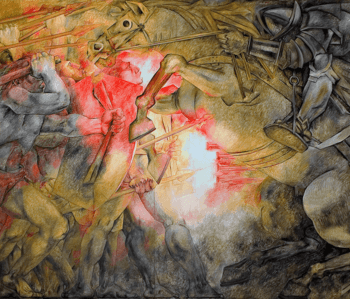1543–1544 Pachecos entrada facts for kids
Quick facts for kids 1543–1544 Pachecos entrada |
|||||||
|---|---|---|---|---|---|---|---|
| Part of the Spanish conquest of Yucatan | |||||||
 Conquest (mural 1971–1979 by F. Castro Pacheco / photo 2004 by Cuilomerto) |
|||||||
|
|||||||
| Belligerents | |||||||
| Commanders and leaders | |||||||
|
|
||||||
| Strength | |||||||
|
25 to 30 infantrymen | ||||||
| Casualties and losses | |||||||
|
|
||||||
| halach winik = commander-in-chief; nakomo'ob = commanding officers or commanding generals; the halach winik of Chetumal was also the commander-in-chief of Uaymil | |||||||
The 1543–1544 Pachecos entrada was a major military campaign. It was the last big step in the Spanish conquest of Yucatan. This campaign brought three Mayan states under Spanish rule. These states were in the southeastern part of the Yucatan peninsula. They became part of Salamanca de Bacalar, a Spanish town in New Spain. Many people consider this entrada (meaning "entry" or "expedition") to be one of the most brutal. It led to the deaths of hundreds or even thousands of Mayan people. Tens of thousands more were forced to leave their homes.
Contents
Why Did the Spanish Come to Yucatan?
Early Spanish Interest
Spanish settlers from colonial Cuba were the first to look at conquering Mayan lands. They heard exciting stories from the 1517 Hernández de Córdoba expedition. This expedition reported amazing cities, which the Spanish thought were full of gold.
However, the Cubans soon became busy with the conquest of the Aztec Empire. This meant they put off conquering the Yucatan peninsula for later.
Francisco de Montejo's Campaigns
The serious conquest of Yucatan began when Francisco de Montejo was named adelantado (a special governor) in 1526. Montejo's first campaign, from 1527 to 1528, focused on the eastern areas. These included Uaymil and Chetumal.
This first attempt did not succeed. So, another campaign was needed from 1531 to 1533. This one also failed to fully conquer the region.
What Was Left to Conquer?
By early 1544, the Spanish had taken control of the western, northern, and northeastern Mayan areas. These were turned into Spanish districts like Campeche, Merida, and Valladolid.
This left only the southeastern provinces to be conquered. These were Uaymil, Chetumal, and Dzuluinicob.
The Pacheco Expedition
Setting Out from Merida
In April 1543, Gaspar Pacheco was given an important job. He was made lieutenant governor and captain general. His mission was to conquer Chetumal, Uaymil, and other native settlements.
Pacheco gathered 25 to 30 soldiers from Merida for this campaign. He made his son, Melchor, second-in-command. His nephew, Alonso, was third-in-command.
The Journey and Hardship
The group left Merida in late 1543 or early 1544. In Cochuah, a recently conquered area, Pacheco forced the local people to help. They had to provide carriers, servants, and food. This caused a severe food shortage for the people of Cochuah.
When they entered Uaymil, Pacheco started what is called "one of the bloodiest campaigns." It was also seen as the cruelest part of the entire conquest of Yucatan.
A Change in Command
While in Uaymil, Gaspar Pacheco became very sick. He had to go back to Merida. Command of the expedition then passed to his son, Melchor Pacheco.
The people of Uaymil and Chetumal did not welcome the Spanish. They decided to fight using guerrilla tactics. This meant they destroyed their farms, blocked roads, and left their villages empty.
A War of Survival
Food became very scarce for both sides. Both the Spanish and the Mayans had to search for food. This quickly turned into a war of attrition, where each side tried to wear down the other.
Facing starvation, the Pachecos used extremely harsh methods. These actions were much more severe than those used by other Spanish leaders.
Spanish Victory and New Town
These harsh tactics, along with the lack of food, eventually forced the Maya of Uaymil-Chetumal to surrender in 1544. At this point, Melchor Pacheco founded a new Spanish town called Salamanca de Bacalar.
He set up its local government and assigned its twenty Spanish residents. He also divided the conquered lands among them.
Pushing South
In 1544, the Pachecos continued their push southward. They went through Dzuluinicob and into the lands of the Manche Ch'ol and Mopan people. Their goal was to reach the Golfo Dulce.
What Happened Next?
A Shrinking Population
Many people agree that the Pachecos' victory came at a great cost. Before the conquest, Uaymil and Chetumal were said to be rich areas with many people.
However, the district that Salamanca de Bacalar controlled became very empty and poor. It stayed that way for a long time. Many Mayan people likely moved away to avoid Spanish rule.
| Year | Population |
|---|---|
| 1511 | 150,000 |
| 1549 | 12,500 |
| 1580 | 1,000 |
| 1609 | 750 |
| 1639 | 700 |
| 1700 | 700 |
Dominican Friars' Objections
Soon after 1544, a group of Dominican friars spoke out against the Pachecos' southern campaign. One of these friars was Bartolome de las Casas. The friars believed they had the right to control the Golfo Dulce area.
Eventually, the Spanish Crown and a high court sided with the friars. They officially banned any non-Dominicans from settling in the gulf area. This stopped the Pachecos' efforts in that region.
The Pacheco Legacy
The Pacheco entrada is widely remembered as one of the most violent and cruel campaigns. It stands out in the history of the Spanish conquest of Yucatan.
Images for kids
 | James B. Knighten |
 | Azellia White |
 | Willa Brown |


